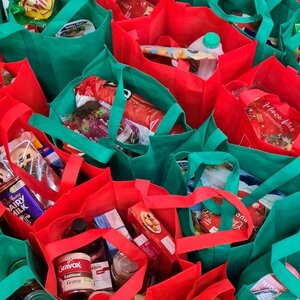SNAP enrollment fell, food pantry use rose for non-citizen New Yorkers

The use of food pantries among non-U.S. citizens in New York City increased amid Trump-era immigration rule changes, while Supplemental Nutrition Assistance Program (SNAP) usage decreased, a report from Robin Hood finds.
Released in collaboration with Columbia University’s Center on Poverty and Social Policy, the report, Spotlight on Food Assistance in New York City (10 pages, PDF), found that in 2021, 30 percent of New York City adults and four in 10 families with children faced food hardship—defined as sometimes or often running out of food or worrying that food would run out before they had money to buy more. SNAP enrollment had been falling among non-U.S. citizens since the Trump administration began outlining changes to the “public charge” rules for citizenship that disincentivized the use of SNAP; enrollment declined 6 percent between 2017 and 2018 and 11 percent between 2018 and 2019.
The rate of food pantry use among citizen adults in New York City rose from about 9 percent between 2015 and 2018 to 13 percent between 2018 and 2022, a 40 percent increase, while the rate among citizens with incomes below 200 percent of the federal poverty line rose from 18 percent to 24 percent, a 31 percent increase. By comparison, the rate of food pantry use among non-citizen adults nearly doubled from 11 percent to 20 percent, and among low-income non-citizens, the rate increased nearly 80 percent, from 17 percent to 30 percent.
“In the wake of COVID, food pantries have played an outsized role in helping New Yorkers afford food. Compounding the challenges brought on by the pandemic, anti-immigration rhetoric and policy have had a chilling effect on people’s willingness to engage with the public food assistance system,” said Matt Maury, senior research analyst at the Center on Poverty and Social Policy. “Our Poverty Tracker data show that the post-COVID increases in pantry use have been especially pronounced among non-citizen New Yorkers who have been pushed away from public programs meant to ensure families and children have enough to eat. These findings also highlight how food pantries provide a safe haven for non-citizens who are striving for a permanent citizenship status.”
(Photo credit: nico smit via unsplash)




